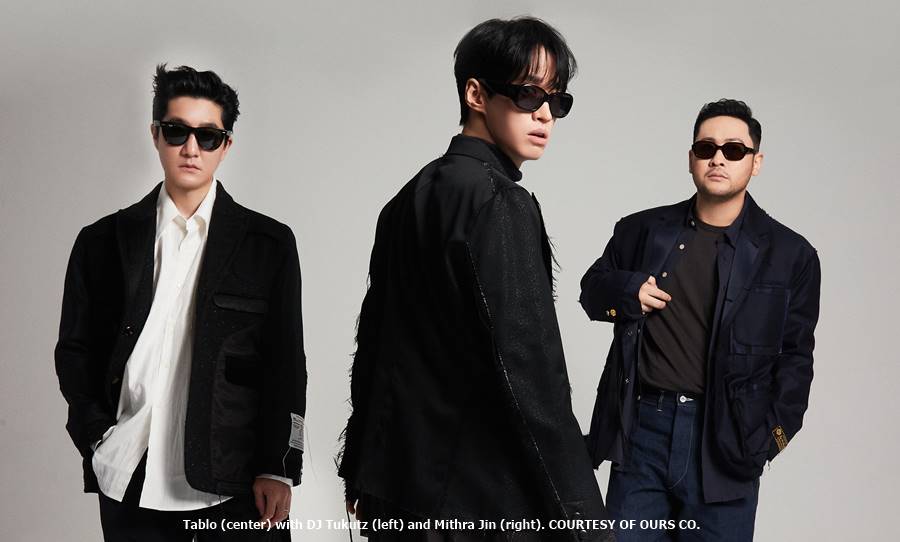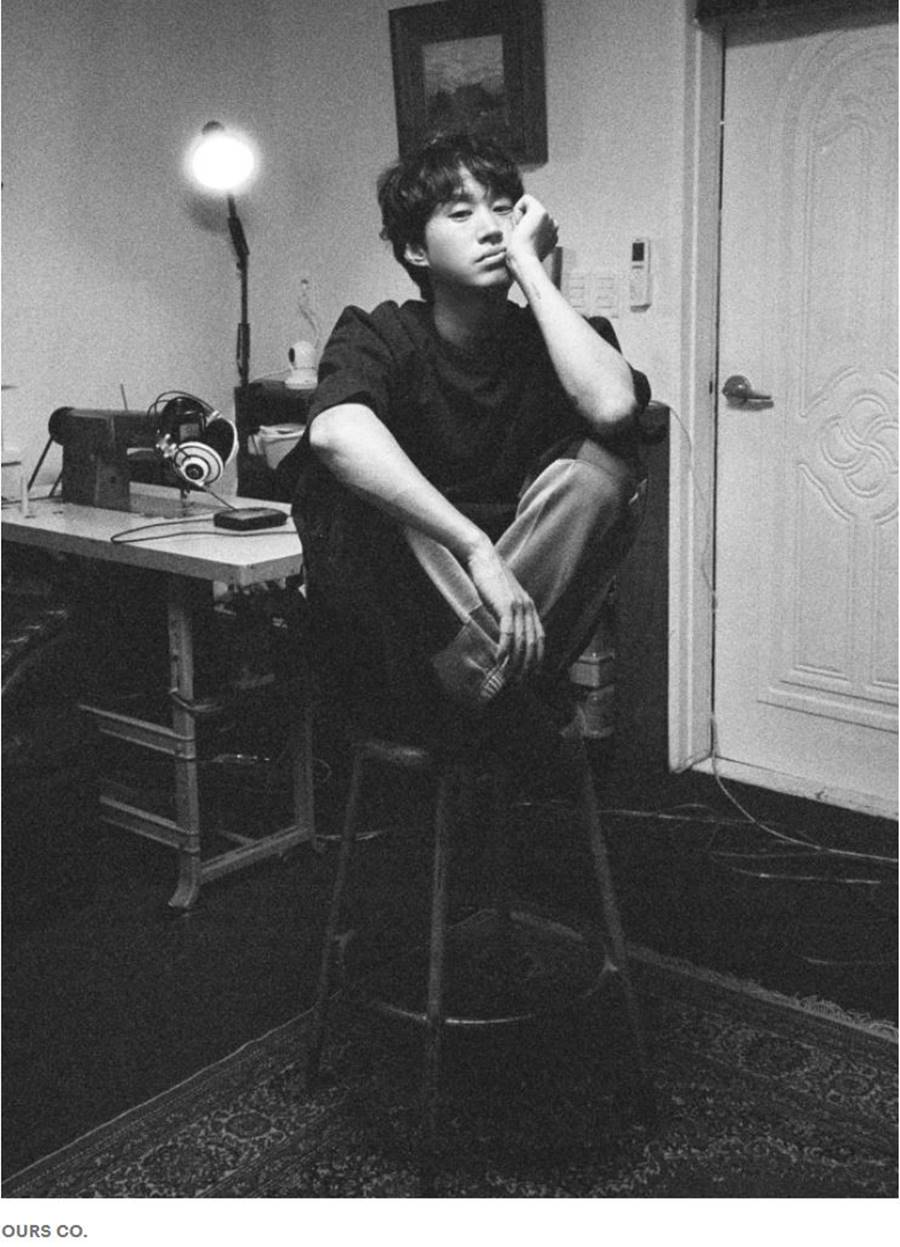
By Jae-Ha Kim
Rolling Stone
January 31, 2023
ONE YEAR AGO, Tablo wasn’t sure if there would be another Epik High album. By that point, the Korean hip-hop trio – which also includes co-lyricist Mithra Jin and co-producer DJ Tukutz – had already been together for 21 years, and were concentrating on the release of Epik High Is Here下 (Part 2), the second half of their 10th studio album. Rumors circulated about the group’s possible disbandment, fueled by the members’ own ambiguous comments.
And then, a month ago, Tablo released a humorous video announcing Epik High’s 2023 European and North American tour, which kicks off Feb. 6. Making fun of his own previous statements, he shouted, “You may never see us again! That’s what we said every year! But we don’t know! Life is crazy! The world does not go the way you planned it! This is the last chance, maybe, perhaps, to see Epik High!”
The All Time High Tour will be preceded by the Feb. 1 release of the group’s EP Strawberry, a taut collection of five songs. This year marks the 20th anniversary of the release of Epik High’s debut album, Map of the Human Soul, and some fans may be anticipating that Strawberry will be a sentimental nod to their earlier recording. Instead, Strawberry marks the beginning of Epik High’s second chapter and is a taste of what the group has prepared for the future.
“I think people are probably expecting [an EP that is] more like celebrating the last two decades,” Tablo says in a Zoom interview from his Seoul bedroom. “But I didn’t want the first work of our 20th year to be something that looks back. I wanted to look forward and kind of rage against the times. People have come to expect a certain emotional vibe from us, like lo-fi hip-hop. I don’t think people are going to expect this kind of energy lyrically, because it’s irreverent — sort of just F.U.”
Indeed, simmering contempt permeates much of the EP’s lyrics, which decry haters and keyboard warriors. The record includes “On My Way,” a blistering collaboration with Got7’s Jackson Wang, the deceptively gorgeous “Catch” – which offers guest vocals from Mamamoo’s Hwasa – and the trippy instrumental title track.
“I generally have someone in mind when I’m writing songs,” Tablo says. “For example, a song like ‘Catch’ wouldn’t work if the vocalist was just a good vocalist. We needed somebody who as a person also lives that life, who lives that message. And with Hwasa, you can imagine her saying F.U. to haters in the most elegant way. That’s exactly what we needed ‘Catch’ to do. At the beginning of the song, the lyrics are saying that no matter how hard you try, you’ll never catch me. But towards the middle when I say, ‘Call me before you hit the ground, I’ll be there to catch you,’ that’s when I’m speaking to my family, friends, fans, or just anyone in general who needs someone to catch them.”
To understand the evolution of Tablo’s lyrics is to acknowledge the trauma he went through more than a decade ago, when TaJinYo — an online community of hundreds of thousands of antifans — orchestrated a smear campaign meant to end his career. His crime? Besides writing the book Pieces of You, a bestseller in Korea, while still in college, he had graduated from Stanford University in a little under four years with both his bachelor’s and master’s degrees. Even after the school went on record multiple times confirming that Daniel Lee (Tablo’s birth name) had indeed accomplished all of the above, TaJinYo members continued to spread inflammatory rumors claiming falsely that Tablo had paid off the esteemed university to lie on his behalf.
There’s a relatively new Korean word that didn’t exist when Tablo was a child: umchina/엄친아, which is a portmanteau for 엄마 친구 아들/umma chingu adeul, or mother’s friend’s son. The idea is that while this 엄친아 may not even exist in real life, he is the ideal person who Korean children are constantly compared to. For the vindictive members of TaJinYo, Tablo was an 엄친아 who needed to be revealed as an opportunistic liar.
From a Western perspective, this all may sound ludicrous; no one is scrutinizing the college records of your average U.S. superstar. But in South Korea, celebrities with strong educational backgrounds are elevated and praised for their brain power. If there’s even a hint of fabrication, though, lord help them.
For example, Korean American actor Daniel Henney (Missing, X-Men Origins: Wolverine) was launching his career in South Korea in 2007 when he became embroiled in a supposed academic “scandal.” Though he isn’t a Korean national, representatives for Henney were forced to apologize because of rumors that he had graduated with a degree in economics from the University of Illinois at Chicago, which some netizens had mistaken for the more prestigious University of Chicago. In fact, the actor never attended either of the colleges — and had never claimed he did.
As for Epik High? During 2010 to 2012, Mithra Jin and Tukutz were serving mandatory military duty, which almost all able-bodied South Korean men have to complete. As a Canadian citizen, Tablo was exempted from enlistment. This didn’t sit well with the predominantly male TaJinYo members either. Isolated at home with his wife (Oldboy actress Kang Hye-jung) and their baby, Tablo took that time to channel his experience into his two-part solo debut, Fever’s End: Part 1 and Fever’s End: Part 2, which were released months apart in 2011.
In 2012, Tablo received some justice. Eight of the most ardent perpetrators who had defamed and threatened him and his family were sentenced to prison. Still, years later, that awful period of his life continues to resurface in his music — sometimes blatantly, like, on the explosive 2014 single “Born Hater,” which was the first time he publicly called out TaJinYo in a song, and more obliquely on Strawberry.
“When I did that [on ‘Born Hater’], I was very scared,” he says. “The label was like, ‘Maybe you want to change your lyrics because it might bring attention to something you don’t want to think about. There was some fuss about me talking about the people that hurt me — that was [considered] wrong in the eyes of some people. But every time I opened up about it, I did it in different ways. Sometimes I would be very serious. Sometimes I’d be kind of joking.”
He mentions a recent appearance on South Korea’s popular entertainment program Hwasa Show where he makes light of his situation: “Some people are gonna be like, ‘What the hell?’ or maybe they’ll feel uncomfortable, but these are just ways for me to bring it under control into something I can understand. Some people might think, ‘Hey, yo, it happened 10 years ago, man. Just forget it. Enough.’ But the thing is, the people who did this to me are still here. They didn’t disappear. These people are walking around the streets of Seoul, Chicago, New York, any place.”
Broadcast journalist Sean Lim — a college friend of Tablo who attended Stanford alongside him — says he vividly remembers this modern-day witch hunt. He was horrified to see people questioning what he knew to be Tablo’s real achievements, with some going so far as “comparing fonts and spacing on internet photos of his diploma.”
“Tablo’s controversy was like a relief valve to those who were obviously very jealous,” says Lim, now a YouTuber seen on SeouliteTV. “At the heart of the discomfort was that Tablo made people feel inferior. Was it really possible to be an academic genius and a pop star? Usually the universe is only supposed to hand you one. But both? To many, it seemed just too unfair. But these people never considered for a moment that he had to do twice the work and take twice the risk.”
When Lim showed support for Tablo, the antifans turned their vitriol to him, accusing him of perpetuating lies. At the time, Lim was an on-air anchor for a news program on South Korea’s Arirang TV. He remembers being stunned that even some of his own colleagues — journalists — bought into the fake news.
“TaJinYo targeted me, too [and] tried to get me fired,” Lim says. “They left hateful messages on the company’s website every day… That was a taste of what Tablo went through. The people around you just didn’t help or really get it. I was surprised at how many normal people around me at work wanted to buy into the smear campaign so that they could feel less inadequate. There are a lot of covert narcissists at Korean companies who like to see others fail.”
The most frustrating part of TaJinYo was that there was no real win for Tablo. Yes, eight members were punished. But what about all the others who harassed him relentlessly from the privacy of their homes?
“When I won, did all [the members of TaJinYo] disappear from the face of the planet?” Tablo asks. “No, they all went back to their lives and probably moved on to do it to other people. I’m pretty sure they’re next to me when I’m buying bread, or when I’m buying strawberries, or they’re sitting next to me when I’m at a movie theater, or are doctors and nurses at the hospital I go to. Literally, there were doctors and scientists — legit people in society — who were caught. What I’m saying is they’re all still here. Ninety-nine percent of them walked away without any punishment, like they were walking away from a video game. How can I stop talking about it? How can I stop thinking about it?”
As another way of processing his past, Tablo is working on a fictionalized version of his life in a scripted series — tentatively titled Neon Machine — that will reflect on the stories he’s ready to share.
“I think it’s timely, and thank God that I’m strong enough to deliver that story and I’m here to tell it,” he says. “A lot of people need some kind of story that they can refer to. I did not have one. There wasn’t a single case that I could look to and get some courage from. It just didn’t exist. It was the first of its kind when I experienced it, and because I felt that and felt lonely, I want to get this story out there in different forms so that people, [especially] young kids who are going through things like that and have a reference that they can look at and use as an anchor or as encouragement.”
Discussing mental health issues is a touchy subject for many Koreans. Even in the United States, studies have suggested that Asian Americans are the least likely of any ethnic or racial group to seek mental health care. Therapists and psychiatrists commend Tablo for discussing what he went through, because while it may be therapeutic for himself, it also helps heal his fans who aren’t sure how to navigate their own emotional wounds.

“Tablo is speaking to a very Korean and Asian sentiment about how he was raised to deal with trauma, especially personal trauma,” says Joy Lieberthal Rho, a LCSW counselor at the Juilliard School. “There was no one ahead of him to help or guide him [during TaJinYo], because the mental health and wellness conversation is still very nascent in Korea and among Asian and Asian American communities. [Just last] week we had multiple tragedies layered on top of now three years of concerted mental and emotional anguish for the Asian and Asian American communities. The conversation around expressing our traumas and assaults is still new. So I celebrate Tablo for choosing to share his thoughts [and struggles] through his music and lyrics. His transparency and willingness to take the risk of being criticized will help so many young Koreans. Someone has to be the first.”
Before this interview, I thought about why this clever hip-hop group decided to name their EP after a beautiful but delicate fruit. Is there some hidden meaning I wasn’t getting? Was bilingual wordplay involved?
“Well, first of all, all three of us like strawberries,” Tablo says. “When we thought of something fresh, strawberry was the first thing that popped into our heads.”
Just as I’m about to comment about that sweet sentiment, he adds, “At the same time, when you smash a strawberry, it looks like blood. The strawberry literally has nothing to protect it.”
This explanation offers a broader perspective to the tracks on Strawberry, which reflect on not just his, but the group’s survival. In “On My Way,” he spits out, “Hate me, I don’t give a fuck.” And he forthrightly addresses online vitriol on “Down Bad Freestyle”: “Someone just got canceled/I can hear it through the window/I feel for the man/Have you seen all the tweets, though?” But in the EP’s soothing closer “God’s Latte,” there seems to be a cathartic release as Tablo asks, “What kind of people end up in hell?” While God has no answer on the track, Mithra Jin does: “We all live in the same hell.”
We talk a little bit about the Netflix revenge K-drama The Glory, which Mithra and Tukutz have recommended he watch. I mention how it’s sometimes easier for outsiders to understand trauma when there are physical scars they can see, rather than emotional ones that are hidden away.
“People are like, ‘Oh, you overcame [TaJinYo]!’” Tablo says. “But what did I overcome?” He mentions the death of his father, which he attributes in part to the stress of the false accusations. “I lost my dad and two or three years of my life that I will never get back. I have barely any recognition of [my daughter] Haru’s early childhood. I was physically there because I couldn’t leave the house, but mentally I was absent. And they say I overcame it? They say I won? What did I win exactly?”
The irony is that South Korea has one of the world’s most draconian defamation laws, where people can be sued for telling the truth, if the information damages a person’s reputation.
“That’s why for me, the only sweet revenge I can get is to continue thriving in their faces,” he continues. “And that’s not even that satisfying. You’ve got to understand that these things I lost, nothing will make up for it. Nothing. I could get personal revenge on every single person that participated in this and I still wouldn’t be able to fix any of these things. I just can’t. But what I won’t do is be afraid to tell my own story.”
It’s this willingness to be defiantly vulnerable that has made him a popular collaboration partner for artists like Eric Nam, CL, Big Bang’s Taeyang, Brown Eyed Soul’s Naul, Lee Hi and, finally, BTS leader RM. Last year, the two made fandom dreams come true when Tablo traded verses with RM on “All Day,” from the idol’s critically-acclaimed debut solo album, Indigo.
“I was literally getting on a plane to go to Singapore to perform and RM texted me, [saying] ‘I have a song that I want to do with you,’” Tablo says. “And I literally could not listen to the song at the time. I couldn’t even download it. So I said, ‘Yo, I’m getting on a plane right now — but yes, of course.’ I hadn’t even heard the song and he’s laughing. But I mean, obviously, right? RM is not going to do a bad song. He’s incapable of doing that.”
When he got to Singapore, he continues, “The song was pleasantly not what I expected. I thought it was going to be either hard hitting hip-hop or something emotional. But it was something more energetic and positive-sounding that I really needed at the time – that energy. I told him I can record as soon as I get back to Korea. I think I sent him my phone recording. It all happened very fast.”
The lyricists trade verses in both Korean and English and partake in clever wordplay, paying homage to each other’s music. While Tablo references BTS’ hit songs “Dynamite” and “DNA,” RM pays respect to Epik High’s “Fly” — the 2005 song that influenced 11-year-old Kim Nam-joon to become rapper RM.
“To me, Tablo is like a huge mountain that I always look up to,” RM tells Rolling Stone. “Among many things, I admire his poetic and insightful lyrics, his musicality, and career as a musician, the way he overcame all the hardships he went through. Just listen to ‘Fever’s End,’ and you can feel it.”
Some might say that the two musicians get along so well because they’re skilled songwriters who bring a lyrical sense to their raps — or that they’re both geniuses who are renowned for their nimble minds.
“Tablo is a genius, but I’m not sure about myself,” RM continues. “I just try to give my best effort in everything. We have different backgrounds, but since he’s always been the hero throughout my musical journey so far, I think we could recognize each other. Epik High and Tablo have always been there during my childhood and they definitely influenced my music. Tablo is one of those who can handle social issues in sharp and beautiful ways through music…. I’ve always wanted to collaborate with him on a song in 2000s hip-hop that touches on a social issue.”
I ask Tablo if there’s the possibility of RM returning the favor and guesting on his upcoming solo album — his first since 2011’s Fever’s End: Part 1 and Fever’s End: Part 2. His reply is a combination of faux shock and bemusement.
“Who leaked that?” he asks, before cautiously replying. “OK, let me just put it this way. If there is a Tablo solo in the works, RM would definitely be Number One on my list to do a song with. But I also want to explore that more emotional, sort of painful kind of Epik High vibe, but in a completely new way with RM. And I’m just saying, if it were to happen, I think RM would do it. So that’s all I’m gonna say.”
The day after our interview, Tablo sends a short email message confirming that he is working on his second solo album and that “another Tablo x RM collab is in the pipeline.”
Daniel Lee is once again ready to fly.






I will admit I don’t know much about Tablo and Epik High but this piece was so well written. Also gave so much insight into what he’s gone through as an artist. It’s truly so heart-wrenching.
Also, always happy to here about more Tablo/RM music coming 🥰
After seeing Tablo with Suga on his Suchwita show, I read your very insightful article. Today I bought 2 tickets to see Epik High in Oakland on April 8th. I’m taking my Army friend. Fingers crossed for Suga tickets March 1st.
Thank you for letting me know! Epik High are incredible live. You will have the best time!!
And let the Hunger Games begin for Suga tickets… haha